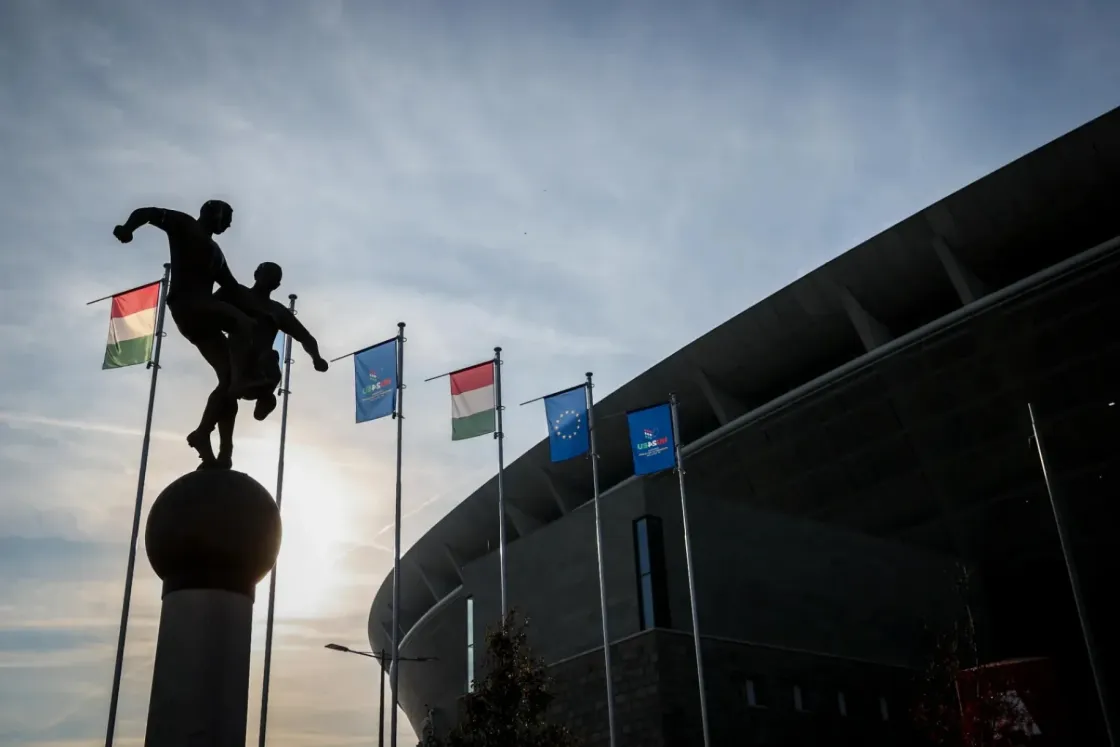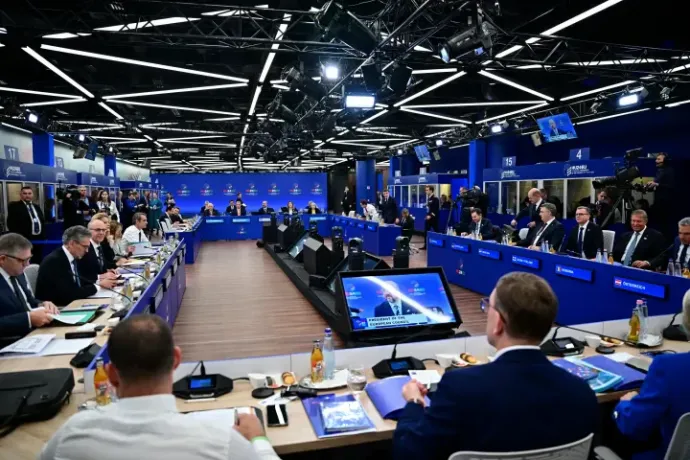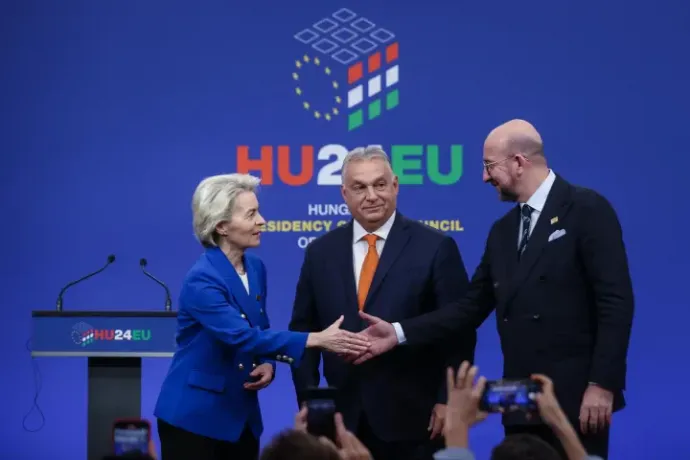It was "the greatest diplomatic event in Hungarian history". But what was its result?

"It was a nice little gathering with good results"
– Viktor Orbán declared at the press conference held in Budapest after the double summit last Thursday and Friday. The Hungarian government consistently referred to the European Political Community (EPC) summit and the informal European Council meeting as the biggest diplomatic event ever held in Hungary.
No boycott, but no call from Trump either
The Facebook video below is perhaps the best illustration of the government's main domestic political objective with the two-day summit:
At his Friday press conference, the Prime Minister also pointed out that although some had said that Hungary was isolated, that it wasn't liked or was at least disliked, they said there would be no summit because the leaders wouldn't come, but in the end they came, and there was good cooperation.
While polls have been indicating the strengthening of the Tisza Party, the event provided an opportunity to portray Orbán as an influential figure in European politics (and even one on the world stage, according to opinions in the ruling party). At the same time, Péter Magyar, leader of the Tisza Party also tried to point the spotlight on himself by meeting with Austrian Chancellor Karl Nehammer and French President Emmanuel Macron on the sidelines of the summit.
As previously written, the fact that the meetings were held in Budapest is not in itself a diplomatic feat, but is due to the fact that the Hungarian government is the one currently holding the rotating presidency of the EU Council of Ministers, and it happened to fall on the second half of the year. Even Orbán himself mentioned that during the previous Hungarian presidency, held in the first half of 2011, there was no informal summit of heads of state and government, so there was no such summit in Budapest back then, and the EPC was only established at the initiative of Macron in 2022.
In spite of this, it was not a given that things would go on as usual, even though a potential postponement would not have been particularly risky. The European Parliament adopted two resolutions questioning the suitability of the Hungarian government for the presidency, but only the governments of the member states could have made a decision about that, and only a few had publicly raised the issue ahead of the presidency. Orbán managed to upset the vast majority of them by conflating the presidency and his 'peace mission' a few days after Hungary took over, but even though the August break, for example, could have in theory given them an opportunity to do something, nothing happened in the end. Besides, there are preparations which need to be made ahead of the presidency, so switching in the middle of the process would not have been easy for practical reasons either.
Still, there was no guarantee that everyone would come. Orbán's move in July led to several member states and the European Commission boycotting the ministerial council meetings held in Budapest by not sending representatives at the highest level. The Hungarian government was unable to do a trial run of a presidency programme in the Puskás Arena because the informal meeting of foreign ministers planned for the end of August was moved to Brussels because of the protests. Informal ministerial meetings, on the other hand, are much less visible than the summit, and are politically one level lower. At this point, there is only one such meeting left, which means that it will be easy to use the pictures from the summit to pretend that everything is fine around the presidency.

Prior to the summit, VSquare reported that some Baltic and Nordic countries were considering boycotting the event, but the Swedes and Poles eventually abandoned the idea. VSquare's newsletter quoted diplomats as saying that Ukraine, the accession of the Western Balkans to the EU and Georgia were more important than Orbán's perception, which is why the leaders of the biggest member states wanted to attend the meetings. According to Szabad Európa, it was after some deliberation that the Baltic states also decided not to boycott the meeting.
Orbán did not seem to be too fazed by the risk of a boycott: in October, immediately after the parliamentary elections in Georgia, he flew to the country to stand by the ruling party that had been declared the winner. Although this time around, he was more careful not to conflate it with the EU presidency. When arriving at Friday's summit, the Baltic leaders underlined their concerns about the fairness of the Georgian election, but did not specifically discuss Orbán's trip.
The meeting was also made all the more interesting by the US presidential election preceding it by just a few days. Of the two annual EPC meetings, one is traditionally held in summer and one in autumn, the latter usually taking place in early October in EU member states. But the current summit was held in November – just days after the US election. There have been reports from several sources that the Hungarian government had a hand in the timing. The timing of the EPC summit also determined its coverage: for example, the BBC, Sky News and Le Monde all reported on it in light of the election of Donald Trump.
There was also confirmation of a report from sources close to the government that Orbán would use the meeting to act as a go-between towards Trump. Prior to the meeting, VSquare, Politico and Szabad Európa all heard rumours that the American president-elect might check into the EU summit via a video link.
As spotted by 444, this was confirmed by the title of an earlier article in both Mandiner and Hír TV (government-friendly publications) but the former is no longer available, and the latter no longer contains the reference. In response to a question from Hír TV, Zoltán Kovács, the government commissioner in charge of organizing the event neither confirmed nor denied the assumption before the meeting. There was, however, nothing to suggest that the former and future American president had actually called in.
Trump, Ukraine and judicial activism
The two meetings still provided Orbán with the opportunity to address a wide international audience at two separate press conferences. He used the first of these mostly to explain his views on Ukraine in light of Trump's election. He did not, however, discuss or receive questions about how the crisis in the German government and the expected early elections might affect this.
Orbán used Thursday's press conference, among other things, to thematise what he has termed "judicial activism". He said that joint decisions made by multiple governments first come up against European and then international judgments, which results in these decisions disintegrating, with Hungary being the only exception. He said there should be a revolt against the laws and court rulings currently in effect. He has frequently emphasized this in recent weeks in relation to the case of Matteo Salvini, a member of the same European party family as him, who is accused of kidnapping for having prevented the docking of a rescue boat carrying refugees.
At their back-to-back press conferences on Thursday, first Orbán and then Ukrainian President Volodymyr Zelensky gave their views on an immediate ceasefire in the Russian-Ukrainian war. The Hungarian Prime Minister advocated for a ceasefire, but when asked whether he considered Vladimir Putin to be pro-war, he evaded the answer. Zelensky, who called Orbán an "armchair- expert", sent a message to both the Hungarian Prime Minister and the EU, saying that a quickly agreed peace without security guarantees or a quick ceasefire without prior clarification of the details would spell doom for Ukraine.
A document on EU competitiveness with Budapest's name on it
Unlike the first day, the second day had a specific objective: a declaration on improving the EU's economic competitiveness. The EU previously had a comprehensive plan for becoming the most competitive area in the world as early as the first decade of the 2000s, known as the Lisbon Strategy. The discussions on its continuation largely coincided with the Hungarian presidency in 2011, and at the time, the government hoped that it would be christened the Budapest Strategy, following the example of the former. It was not to be, however, and in the end it was simply called Europe 2020, so that is how it's been referred to in the regular annual monitoring of the targets.
This time, however, there is a document that has Budapest in its name, even if this declaration may not be mentioned so regularly. Although Orbán claimed that many people even thought it impossible that a declaration would be adopted, according to Szabad Európa, the risk was more about the text not being ambitious and specific enough.
As the paper pointed out, the text adopted in the European Council was largely the responsibility of the staff of its President, Charles Michel. However, documents issued at the end of meetings are usually finalised with the help of EU ministers and permanent representatives of the member states, whose body is chaired by the rotating presidency, which therefore has considerable influence on the final version.

The released text (which we have written about in detail here) is replete with generalities, and peppered with adjectives that often describe objectives which contradict each other. On several points, however, more specific targets are listed, with deadlines of 2025 and 2026, so that the document may well end up being referred to when evaluating whether these have been achieved.
The function of the European Council is not to propose or (at least formally) decide on legislation, but to set out a general strategy. Additionally, this meeting was informal. It is up to the European Commission to translate the contents of the Budapest Declaration into actual legislative proposals which can be decided upon by the ministers of the Member States and the European Parliament.
Orbán indicated that the smiles are only temporary
The meeting was, as things currently stand, the last one with Michel at the helm. After the press conference, his team took a special photo on stage and Ursula von der Leyen praised his work. Von der Leyen, on the other hand, will remain President of the European Commission for another five years. As is customary, she stood up for a joint press conference with the Hungarian Prime Minister, whom she addressed as "dear Viktor", even though she has been regularly criticised by the Hungarian government, has been targeted on billboards across the country, and even though she took a swipe at Orbán at the European Parliament in October.
Anticipating the questions, the Prime Minister himself pointed out to the press that the "serious political conflicts" between his government and the European Commission were "well known to all of you". I also have disputes with the President, but this time Von der Leyen is our guest, we invited her and she accepted the invitation."
"We will fight our battles in Brussels."
It is likely that the last time they will face the press together during the presidency will be there as well. They will probably be joined by Michel's successor, António Costa, at the end of the formal EU summit on 19-20 December, as the head of state or government of the country holding the presidency is usually invited to attend at the conclusion of the presidency.
For more quick, accurate and impartial news from and about Hungary, subscribe to the Telex English newsletter!